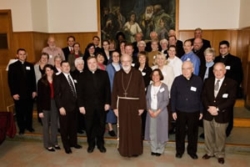Committees to examine faith formation, marriage and pastoral planning
BOSTON — Three new pastoral committees on young adult faith formation, marriage and pastoral planning are currently examining programs offered in the Archdiocese of Boston and will make recommendations to Archbishop Seán P. O’Malley on the needs of the Boston Catholic community.
The committees, formed at the request of the archbishop, met for the first time Jan. 19 at a dinner held at St. John’s Seminary in Brighton.
Archbishop O’Malley said that it is necessary to focus on pastoral initiatives and challenges, especially after the difficulties the archdiocese has faced in recent years.
The archdiocese is currently implementing two important initiatives — the 2010 Initiative designed to improve the archdiocese’s school system, and the Operations and Financial Review of a variety of elements of archdiocesan life, especially those related to the central administration, he said.
“As these studies continue to progress, pastoral ministry and outreach also continue in a myriad of ways and places in the Church of Boston. After prayerful discernment and consultation with others, I have identified three areas of pastoral life that I feel are particularly challenging for us today,” he said.
The archbishop outlined some of the challenges that the committees will address, including properly forming young Catholics in the faith, promoting marriage at a time when fewer people are seeking marriage in the Church and ensuring that every parish is equipped to welcome all.
The Faith Formation Committee will address youth and young adult ministry. They will place particular emphasis on the newly confirmed to young adult Catholic population, according to Father Matthew Williams, chair of that committee and parochial vicar at St. Mary Parish in Dedham.
The committee has met twice since the orientation meeting. At the first meeting, members heard a presentation on national studies of college student spirituality to better understand where that group is coming from. The second meeting addressed the theological vision and outreach for young Catholics that the United States Conference of Catholic Bishops has established, he said.
“These two meetings help to give us a framework,” Father Williams said. “Now we can go out and evaluate what’s out there for programs and bring to light the great things that are being done in order to make recommendations to the archbishop as to what will best help us as a diocese respond to the challenges of the times.”
The Marriage Committee, scheduled to hold their first meeting Feb. 17, will address the current trends in marriage and existing programs for marriage education, preparation and enrichment available in the archdiocese.
“I’m excited about the committee and the prospect of creating new initiatives,” said Kari Colella, chair of the committee and coordinator of marriage ministries for the archdiocese. “There is so much that can be done.”
Father George P. Evans, a member of the Presbyteral Council and pastor at St. Julia Parish in Weston, is the chair of the Pastoral Planning Committee, which held its first meeting Feb. 14.
Father Evans said he hopes the committee will be able to address the care of God’s people in a way that takes into account the available resources and present limitations. Each parish has its own resources, demographics, history and challenges. From there the committee would have a strong sense about what any parish should be, he said.
“We hope to respect the sense of mission of the Church that’s already there, and to gather up the good insights and vision of many and to present them to the archbishop and the archdiocese for further action,” he added.
Archbishop O’Malley told the members of all three committees that after he receives their recommendations, he will present them to the Administrative Cabinet as well as the archdiocesan Pastoral and Presbyteral Councils for further consideration. After that, it may be necessary to form special task forces to address complex areas before final recommendations are made for review, acceptance and eventual implementation, he added.
<



















